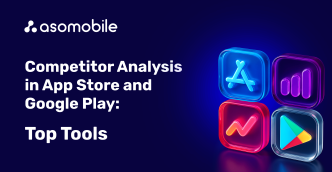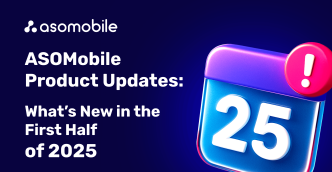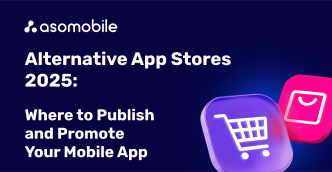What to look for when choosing the best keywords
How to choose the best keywords for your app? First, find all possible keywords related to your mobile app or game.
Popular keyword search methods for ASO
Let’s see the popular ways of keyword searching for App Store Optimization (ASO).
Here are some tips:
- Brainstorming: Start by brainstorming relevant keywords for your app. Think about the features, benefits, and problems your app solves, and come up with descriptive words and phrases that people might use to search for apps like yours.
- Understand your target audience: Identify your target audience by demographic and psychographic characteristics. Understand their interests, needs, and preferences to determine the keywords that they would use to search for apps similar to yours.
- Keyword Research Tools: Use ASO keyword research tools like ASOMobile to find keywords relevant to your app. These tools will provide you with data on the volume of searches for specific keywords, their competition level, and the difficulty level of ranking for them.
- Competitor Analysis: Analyze the keywords used by your competitors in their app titles, descriptions, and tags. This will help you identify the keywords relevant to your app and have a high search volume.
- Social Media: Monitor social nets like Twitter, Instagram, and Facebook for hashtags related to your app or its category. Then, use these hashtags to identify relevant keywords.
By combining these methods, you should be able to identify a list of relevant keywords after incorporating them into the app's title, subtitle, and description to improve its visibility and ranking.
The data of keyword research
When choosing keywords for a mobile app, it's essential to focus on data that can help you determine which keywords are most successful and likely to drive downloads and user engagement. Here are some types of data you should consider:
- App store search data: Review the search terms users use to find similar apps to yours. You can use app store optimization (ASO) tools to analyze this data and identify high-volume, low-competition keywords. You can find many keywords in auto-suggests from stores. The store, with 100% confidence, will offer you existing options.
- Competitor analysis: As mentioned above, this can give you ideas for relevant keywords you may have overlooked.
- Keyword difficulty: Consider the difficulty level of each keyword, which is determined by how many other apps are also targeting that keyword. High-traffic keywords with low competition are the most valuable.
- Relevance: Ensure your chosen keywords are highly relevant to your app and accurately reflect its features and benefits. Using irrelevant keywords can result in low-quality downloads and poor user engagement.
Using these data points, you can choose the best keywords for your mobile app and optimize your ASO strategy for maximum visibility and user engagement.
App store search data
You can use search results of stores as data for your keyword research. Let's check similar apps to ours and find the answer - how will it look like a store search result with our main relevant keywords? For example, let's find out our competitive field with the following search queries - meditation, relaxation, and affirmations.
Or you can use professional tools for App Store Optimization and take the opposite approach. Add your main competitor's apps into analytics and efficiently perform a complete analysis of the keywords of your application or a competitor's application. Let's check it.
In the App Keywords from ASOMobile, you can easily see all search queries on which any application is currently indexed. You can also see here the tips and queries that match the topic. As you can see, our main competitor (hypothetical application) is indexed by 2000+ search keywords. That’s how you can focus on the app`s store search data as a source of keywords for your app.
As we mentioned in our article - app store auto-suggests are one of the most trusted sources for finding new keyword ideas for your app or game. And, of course, ASO services could not bypass such a source of search queries.
Keyword Suggest - a free tool from ASOMobile to look for new keywords.
Competitor analysis
Competitor analysis is an essential aspect of keyword research as it helps you understand your competitors and their strategies, enabling you to improve your strategy. Here are some steps you can take to conduct a competitor analysis to choose the best keywords for your app:
- Identify your competitors: Start by identifying your direct competitors, i.e., other apps that provide similar features or cater to the same audience as your app. Then, you can search for keywords related to your app on the app stores and see which apps appear in the search results (as we did in the first stage).
- Analyze their app metadata: Look at their title, subtitle, description, and keywords. Note down the keywords they target and the language they use to describe their app.
- Look at their app category and ranking: Check which type they are listed under and their current rank in that category. This will give you an idea of their app's popularity with what keywords are and how it is performing in the app store.
As usual, we can provide some tools for receiving this information smoothly - Spy Keywords allows you to quickly find the keywords that your competitors are indexing for, as well as visually compare the positions of your app with competitors. You will be able to find new keywords and also see where you are lagging behind your competitors.
By conducting a thorough competitor analysis, you can identify gaps in the market, understand user needs and preferences, and optimize your app to stand out from the competition.
Keyword difficulty
To see the difficulty of a keyword, you can use various keyword research tools that provide a keyword difficulty score or metric. These tools use multiple factors such as search volume, competition, and other metrics to determine a particular keyword's difficulty level.
Here are some popular keyword research tools that can help you assess keyword difficulty:
In App Keywords, you can find a Complexity of search queries. Complexity is a search query competitiveness index. You will be able to estimate how competitive the applications for this search query are. This indicator will allow you to understand how many resources you will need to succeed with this query. The complexity scale ranges from 0 to 10, where 0 is the least competitive query, and 10 is the most competitive one.
Also, you can meet the Keyword Performance Index. Effectiveness is a search query performance index. This index will help you choose the keys for work that will enable you to receive the most traffic with the least competition among applications.
- Very high one indicates the highest query performance for your application.
- High one.
- Average one.
- Neutral one.
- Low one indicates that the performance is minimal; with the maximum promotion cost, you get the minimum number of installs.
Relevance
Relevant keywords are words or phrases that accurately describe your mobile app or game's content and function.
There are many relevant keywords for a mobile app, depending on the type of app. But we can separate them into general groups, like
- App category keywords: These are the keywords that describe the type of app you have - "mobile games," "arcade games," or "puzzle games."
- Feature keywords: These are keywords that describe specific features of your app - "messaging app," "text messaging," or "chat app."
- User intent keywords: These are keywords that describe what users might be looking for when they search for an app - "workout tracker," "yoga app," or "running app."
- Brand keywords include your app's brand name or the names of specific features within your app.
Checking the relevance of keywords for a mobile app involves assessing whether the keywords accurately describe the app and whether they are likely to be used by your target audience. Here are some steps you can take to check the relevance of your keywords:
- Research your target audience: Understand who your app is for and what keywords they might use when searching for an app like yours. This could involve conducting surveys, analyzing app store reviews, or using keyword research tools to identify popular search terms.
- Assess your app's features and benefits: Make a list of your app's key features and benefits and use these as a starting point for identifying relevant keywords. For example, if your app is a weather app, relevant keywords might include "weather forecast," "real-time weather," or "local weather."
- Use keyword research tools: Many can help you identify relevant keywords and assess their popularity and competition levels.
- Check your app store optimization: Once you've identified relevant keywords, ensure you use them effectively in your app store listing.
- Monitor and adjust: Keyword relevance can change over time, so it's essential to regularly monitor your app's performance and adjust your keyword strategy as needed.
The best way of checking the relevance of keywords is through search results. That is why using professional analytics tools, we can do it in one click:
You can check the search result for any keyword and solve the doubts about relevance.
Let's sum up
Remember, optimizing your app for keywords is an ongoing process that requires constant monitoring and refinement to improve your app's visibility and rank in app store search results.
In the long run, you will repeat the next steps.
- Analyze the (competitive field, your results, and market tendencies)
- Refresh your semantic core.
- Optimize your app title and description.
- Ensure that your app title and description are concise and relevant to your app and not stuffed with keywords.
- Test and refine.
Keywords, their analysis, and approaches used in optimization are the critical section of text ASO. You can find more detailed information, articles, and analytics in our blog. So if you are seriously interested in the question of how to find, analyze and use keywords in the metadata of your application or game, we suggest that you also pay attention to the following publications:
- KEYWORD RESEARCH. WORLDWIDE CHECK
- HOW TO PICK UP KEYWORDS FOR YOUR APP?
- KEYWORDS FOR APPLE SEARCH ADS: HOW TO FIND AND WHICH ONES TO CHOOSE
- FIELD KEYWORDS FOR IOS: HOW TO CHOOSE KEYWORDS FOR YOUR APP
 Українська
Українська  Русский
Русский  Español
Español 






